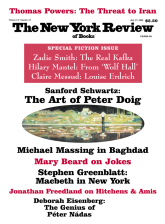In response to:
Free Speech & the Menace of Hysteria from the May 29, 2008 issue
To the Editors:
In his excellent essay “Free Speech and the Menace of Hysteria” [NYR, May 29], Jeremy Waldron shows how, in the United States over the last two hundred years, the state came to be viewed as sufficiently stable that it “did not need the support of the law against the puny denunciations of the citizenry.” To subject the state to “free trade in ideas” is by now seen as carrying little risk and as having considerable advantages for democratic rule. Next, Professor Waldron argues that the case is not parallel for vulnerable minorities—such as, in our society today, Muslims from Asia or Latinos in the Southwest. Here the hate speech that might appear in the marketplace can bring grievous and irreparable harm, and perhaps should be restricted by law.
I applaud Waldron’s distinction between the state and vulnerable groups of citizens. As targets of harsh words, the two indeed present different cases. But the same distinction of state and citizenry raises another question that Professor Waldron does not address, and I wish he would.
If hate speech against vulnerable citizens is to be curbed, to whom should society hand over the precious power to do the curbing? The weak and vulnerable, by definition, are not in a position to exercise this power themselves. Someone else must do it “for” them. But that strikes me as dangerous. How can one set up an authority that will always be immune from abuse of the power to curb speech? (How littered is the twentieth century with examples of political authorities speaking for the “masses,” the “Volk,” the “silent majority,” and so on, but somehow confusing, along the way, their own interests with the welfare of the spoken-for?) When I lived in China in the 1980s, and political campaigns were lumping dissidence together with pornography (both were “obscene,” after all), I gained a new appreciation of the fact that the First Amendment to the US Constitution is expressed as a double negative. It does not say there shall be free speech, as if this were something that Congress is granting, or could grant; it says of Congress itself that there shall be “no…abridging” of free speech.
One might hope that an independent judiciary could be the answer. But Professor Waldron himself explains that US progress toward eliminating penalties for seditious speech has not been due to “the heroic actions of the judiciary.” Hence he leaves me on the horns of a dilemma. Yes, he is right that the vulnerable need protection from hate speech; but on the other hand, all of society needs protection from possible abuse of power by those delegated to do the protecting. We don’t want the cure to be worse than the illness.
Perry Link
Professor of East Asian Studies
Princeton University
Princeton, New Jersey
Jeremy Waldron replies:
I thank Perry Link for his thoughtful letter and I am grateful to have the opportunity to address the question of how hate speech prosecutions might be handled and limited in a society that did not regard laws prohibiting public expressions of racial or religious hatred as unconstitutional. The UK’s public order legislation (incorporating the 2006 Racial and Religious Hatred Act) provides a helpful model.
First, no prosecution for an offense under the legislation may be brought without the consent of the attorney-general. This is an unusual requirement. It is understood that the attorney-general would exercise this power in a cautious and nonpartisan manner (as he or she is required to exercise many other powers under statute), and that prosecutions would be undertaken only in the most egregious cases.
Secondly, the act provides explicitly that nothing in it
shall be read or given effect in a way which prohibits or restricts discussion, criticism or expressions of antipathy, dislike, ridicule, insult or abuse of particular religions or the beliefs or practices of their adherents, or of any other belief system or the beliefs or practices of its adherents, or proselytizing or urging adherents of a different religion or belief system to cease practicing their religion or belief system.
The purpose of this language is to isolate public expressions of hatred as a distinct and extreme phenomenon, to distinguish between hatred of persons and opposition to institutions and doctrines, and to insist that free speech remains as a general background principle, to which the ban on public expressions of racial or religious hatred is a discrete though necessary exception. (Also Article 10 of the European Convention on Human Rights remains important in this regard in patrolling the limits of hate speech laws.)
Thirdly, the English legislation provides a number of defenses against prosecution: that the words were used in a private dwelling and the accused had no reason to believe that anyone outside would hear them, or that the accused did not intend to stir up racial hatred and was not aware that his words might have this effect, are both full defenses.
Advertisement
Obviously how well these safeguards work depends on the background legal and political culture. The second point is particularly important in this regard. It requires the development of some quite subtle yet important distinctions. But these are no more subtle nor it seems to me any more untenable than the fine distinctions we already use on other matters in our constitutional law, including our First Amendment jurisprudence. No law of this kind is wholly proof against abuse, but the experience of hate speech laws in Canada, Europe, and Australasia has not disclosed any disturbing pattern of censorship or any chilling effect beyond the specifically vicious and hateful phenomena that the laws are directed against.
This Issue
July 17, 2008
His Royal Shyness: King Hussein and Israel



